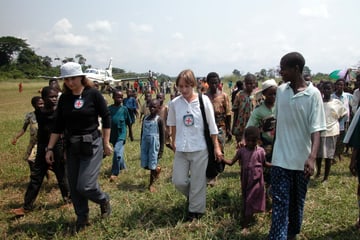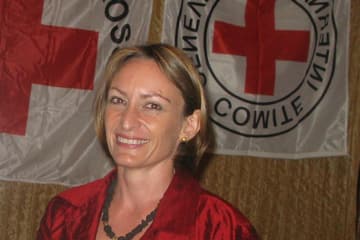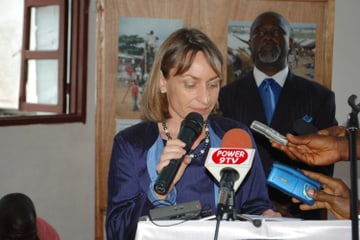"It’s a life of extremes – on the one hand, the most rewarding work there is, on the other, the most draining and demanding"
Karin Hofmann had worked several years in conflict zones with the ICRC. She talks about her most challenging experiences, how she copes with what she saw, and how she re-integrated into Swiss working life.

Karin Hofmann is an author and ex-humanitarian worker who is now Managing Director at the NPO, Wohnenbern. In 1999, she joined the ICRC and went on missions to Israel/Palestine, DRC, Iraq, Iran, Northern Caucasus, Afghanistan, Liberia and Georgia. She experienced how humanitarian work in war zones is demanding, draining and often dangerous and how conflicts can have a disastrous impact on those who live in it, including humanitarians. In this interview, Karin talks about what helped her stay sane and how she managed to re-integrate into Swiss society and pursue her career after her return.
Interview by Nicoletta Cimmino.

What was your motivation to join the ICRC and go abroad to work in conflict zones?
Since I was a child, I knew I wanted a job where I could positively impact someones’s life, where I could help. I always knew I wanted to work for the ICRC. It’s exactly the place where I could make the contributions I was longing to do. I firstly completed my studies in social sciences and gained some experience in the workforce, before applying and getting accepted to the ICRC at the age of 29. This was really a dream come true.
How did you prepare for your first mission in a conflict zone?
Of course, the ICRC provides some initial training before you go on mission, but nothing can fully prepare you for that; you need to live it. I remember my first mission in the occupied territories in Israel in 1999. After having lived there for 10 months, the second Intifada broke out, and suddenly the environment in which I felt relatively safe, changed from one day to another into a war zone. It was difficult to process that the neighbourhood you were so used to was not the same anymore, even from just a week earlier.
Since I was a child, I knew I wanted a job where I could positively impact someones’s life, where I could help.

How did you cope with the situation of living and working in an open conflict zone?
There are two components to it: one is to learn how to act in a situation of open conflict, so more of a safety question; the other is how to live with and process such a situation. Regarding the first point, the ICRC of course prepares staff for that beforehand, but it’s still something else when you then actually experience it. It’s just learning by doing, and I learnt a lot from one of my co-workers who grew up in Palestine in a conflict setting. He had many years of experience with the ICRC, and knew when it was safe to move, or when we had to wait. In terms of the mental processing, the first step is to acknowledge that you are stressed and that this kind of work is draining and demanding. The second step is to act upon that, what you can contribute to your mental health (exercise, sufficient sleep, nutrition) or to reach out and see how your colleagues or professional councillors can support you. It is a life of extremes – one the one hand the most rewarding work there is, on the other, the most draining and demanding.
It is a life of extremes – one the one hand the most rewarding work there is, on the other, the most draining and demanding.
Is it possible to combine such a career with a family life?
I don’t think you can compare this kind of work with the work/life balance of a “normal job”. Working for the ICRC is more a way of life than a job, if you are on the ground, you are ICRC 24/7, no matter the working hours. Doing part-time work is not really possible. When this way of life works for you, it is possible to have a family – maybe not in Baghdad or Kabul, but it is doable. I, however, decided against it. I have a daughter and we returned to Switzerland because I wanted to spend more time together with her.
For the first five years, not a day passed when I didn’t ask myself whether I should go on another mission with the ICRC. Nothing compared to the work I was doing before.
After so many years in conflict zones, how did you manage to return and settle again in “idyllic” Switzerland?
It definitely wasn’t easy for me. For the first five years, not a day passed when I didn’t ask myself whether I should go on another mission with the ICRC. Nothing compared to the work I was doing before. It took me changing jobs three times until I felt I had finally found something that could measure up in terms of challenges and meaningful work. I now manage a nonprofit organisation called Wohnenbern, where we bring shelter to homeless people in Bern. It’s not the ICRC, but rather a mini-ICRC, where I feel like my work has positive impact on people’s lives. After returning to Switzerland, it was also difficult for me to talk to family and friends about what I had lived through and seen. I couldn’t find the right words to express it, because not having been there, they wouldn’t understand. It really helped me to write everything down on paper, which later turned into a book about my time with the ICRC, and which has been published with the approval of the ICRC: it’s entitled, “In every hell, there’s a piece of heaven” (In jeder Hölle ein Stück Himmel, Lokwort Buchverlag, 2018).



